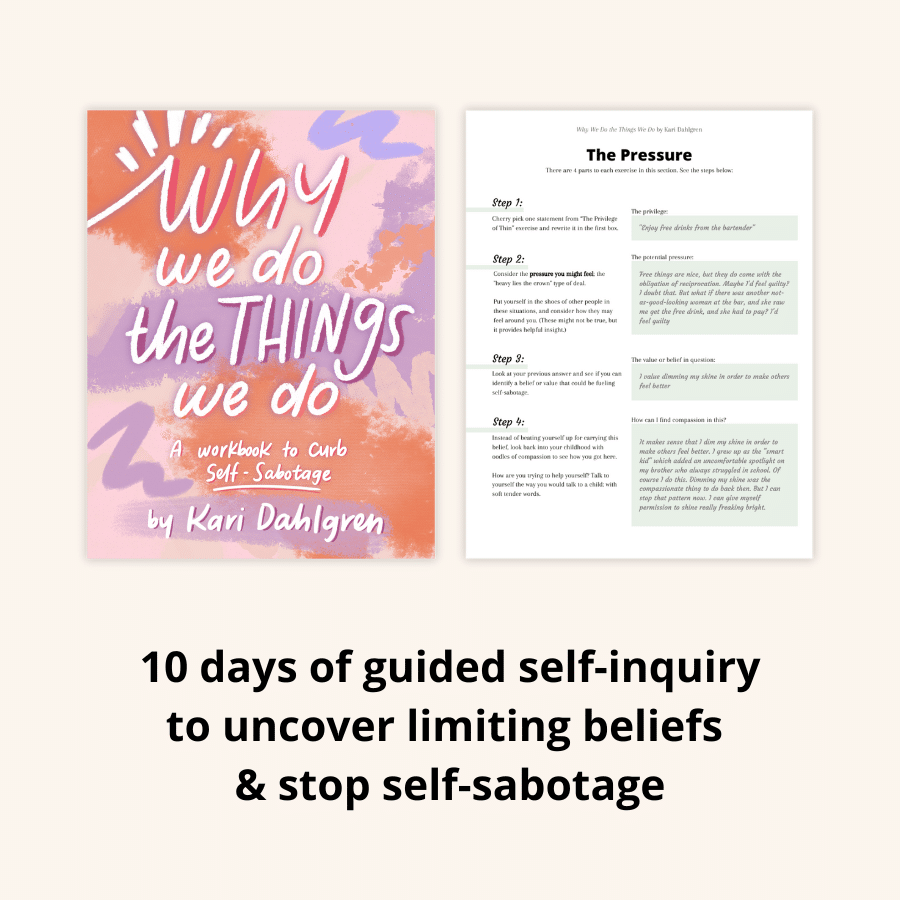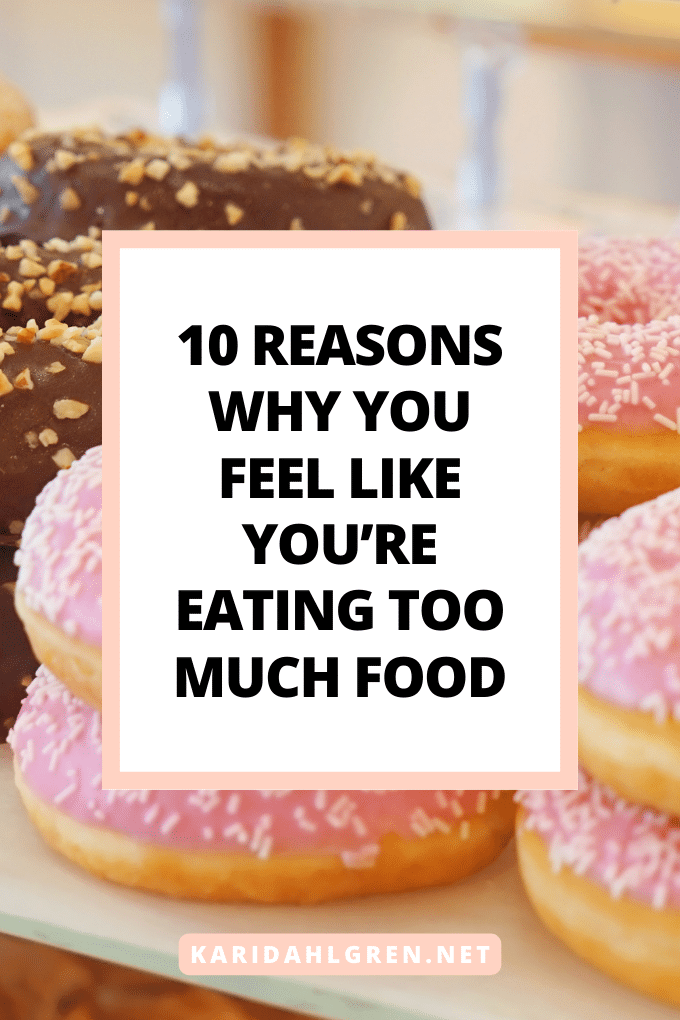
Whenever I find myself wondering, “Why am I eating so much?” the next question I like to ask is, “Was I hungry to begin with, and am I eating past fullness?” Sometimes eating large amounts of food is a normal and healthy response, especially if you aren’t eating past fullness; or may indicate another issue that needs to be addressed. If you’re wondering how to stop eating so much, it’s important to assess if you’re eating enough food to begin with.
Sometimes eating large amounts of food is simply due to biology as the body adapts to meet its needs. For example, when you skip meals, it’s normal for hunger to increase during following meals, resulting in what may feel like an insatiable appetite. When eating behaviors become compulsive, characterized by an inability to stop at physical satiety, it could indicate the need to address the psychology of overeating.
If you consistently find yourself asking, “Why do I eat so much?” you’re about to discover evidence-based reasons for a ravenous appetite. If you also want to learn how to stop eating so much food, it’s helpful to explore both the biological and psychological reasons for increased appetite.
Why Am I Eating So Much? Exploring Common Triggers
As we begin to unpack the underlying factors for eating large amounts of food, the first step is understanding biology. While eating psychology may play a more powerful role for some people, it’s important to start with biology as even the strongest willpower is no match for hormonal imbalances that disrupt hunger and satiety signals, among other powerful factors.
The next time you find yourself pondering—Why am I eating so much?—here are some common factors to consider:
1. Not Eating Enough
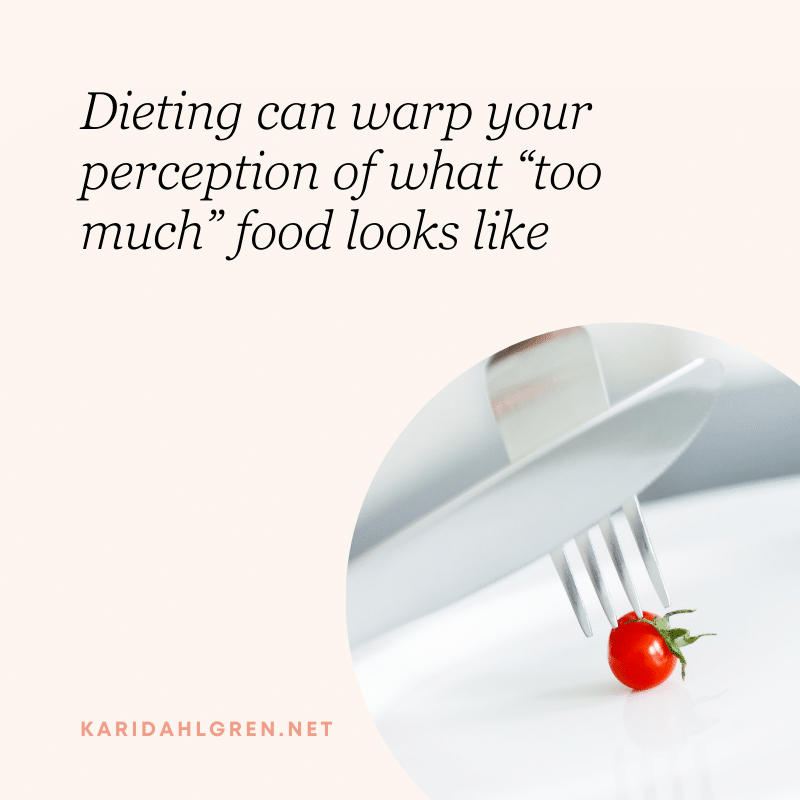
For many, there can be an abundance of guilt and second-guessing around food due to diet culture. When you’re bombarded with images suggesting that less food and a smaller body are inherently better, it’s no wonder that the question “Why am I eating so much and not getting full?” starts to echo in your mind. Unhealthy societal norms, especially around food and body image, can make it challenging to recognize and trust your body’s natural hunger cues.[1]
If you feel like you’re eating too much yet still feel hungry after eating, it’s time to take an objective look at how many calories you’re consuming—not to make sure you’re eating little enough, but to make sure that you’re eating enough. This is especially important if you’re trying to diet to lose weight. Creating a caloric deficit ramps up the body’s production of hunger hormones to motivate eating[2], because the body is wired to promote homeostasis (balance) and rigorously defends it’s set point weight.[3]
Bottom line: Restrictive dieting causes the body to ramp up hunger, potentially leading to a rigorous appetite, which can cause self-doubt in a culture obsessed with thinness.
2. Skipping Meals
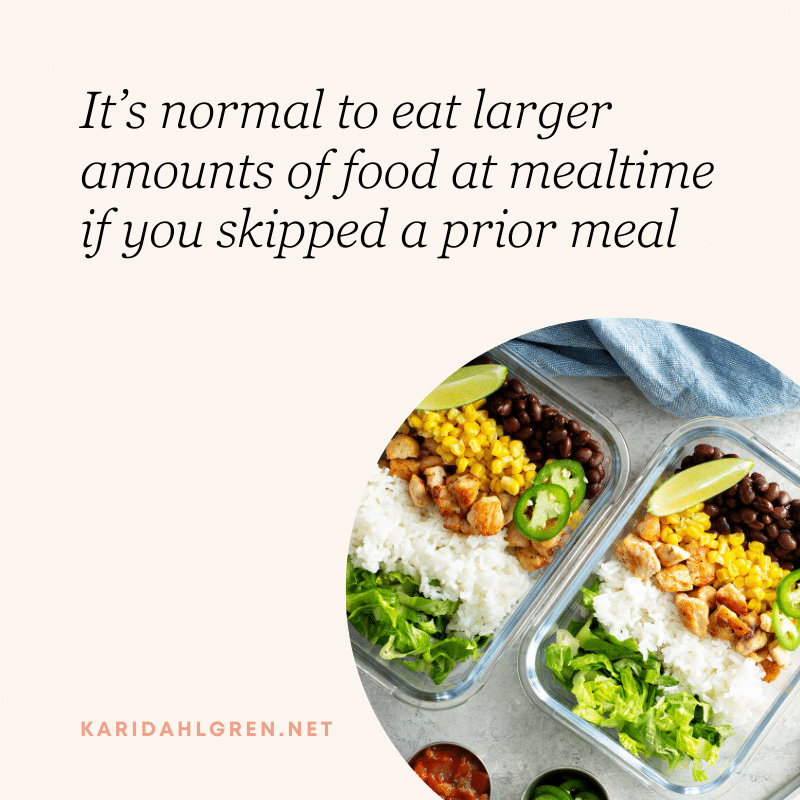
On one hand, fasting has been celebrated for its potential health benefits, including improved metabolic health and weight management.[4] However, if you practice intermittent fasting or generally tend to skip meals, it can lead to increased hunger during subsequent meals.
Meal-skipping is generally associated with eating less calories overall but higher caloric intake per meal.[5], [6], [7] If you tend to skip breakfast or lunch, it could be the reason why you’re left thinking—Why do I eat so much?—by the time dinner rolls around.
Furthermore, while some studies claim that fasting improves metabolic health, other studies have found a link between meal-skipping and increased levels of triglycerides and visceral adipose tissue (“belly fat”), which are strong indicators of poor metabolic health.[8] Other research shows a link between meal-skipping and binge eating[9], further illustrating the potential link between skipping meals and the desire to eat large amounts of food.
Bottom line: Skipping meals can increase your appetite during following meals.
3. High-Intensity Exercise
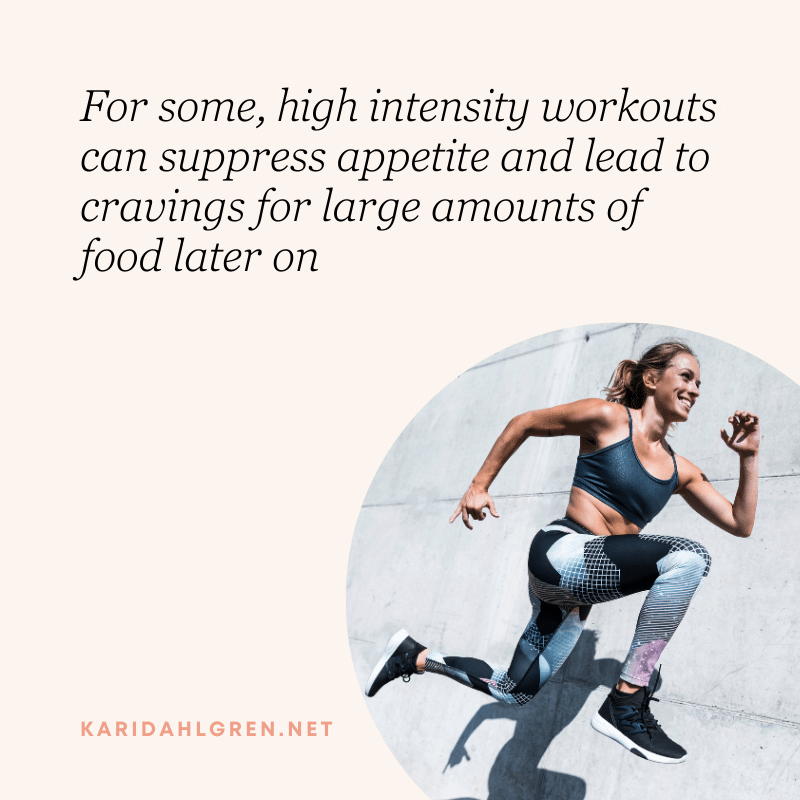
Engaging in high-intensity exercise is widely celebrated for its myriad of health benefits, from improving cardiovascular health to boosting mental well-being.[10] However, the relationship between such vigorous activities and eating patterns can be complex. While not universally observed, some clinical evidence suggests that high-intensity exercise may suppress appetite in the short-term.[11]
Some people may undereat after an intense workout due to this temporary suppression of appetite, which fails to replenish the body. This can lead to what seems like an insatiable appetite later on, which is a healthy metabolic response given the energy expended earlier. In other words, asking yourself “Why am I eating so much?” several hours after a grueling workout could be related to the body’s need for fuel.
Bottom line: For some people, but not all, rigorous exercise can temporarily suppress appetite, potentially causing a desire to eat large amounts of food later on.
4. Too Little Dietary Fat
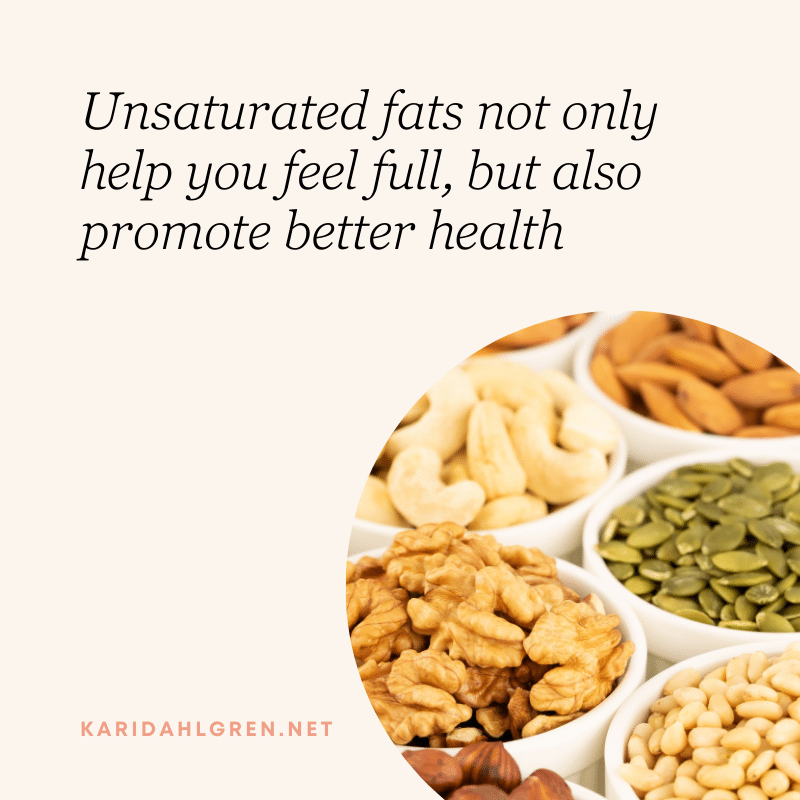
Fats are categorized into saturated and unsaturated types. Saturated fats, found in animal products and processed foods, are associated with poorer health outcomes when consumed in excess.[12] On the other hand, unsaturated fats—found in foods like nuts, seeds, avocados, and olive oil—are linked to improved health, reduced “belly fat,” and increased muscle mass.[13] These are important findings given that some people are afraid of gaining weight from consuming dietary fat, which was a common belief in the 1950s through to the 1990s, but current research has since debunked this.
Furthermore, current studies also shows a link between too little dietary fat and an increased risk of overeating.[14] The next time you find yourself wondering, “Why am I eating so much and not getting full?” check your diet. Consider working with a dietitian to make sure you’re eating enough fat and the right types of fat for your health goals and needs.
Bottom line: Without adequate dietary fat, the body may ramp up hunger signals to compensate for what is lacking.
5. Excessive Stress
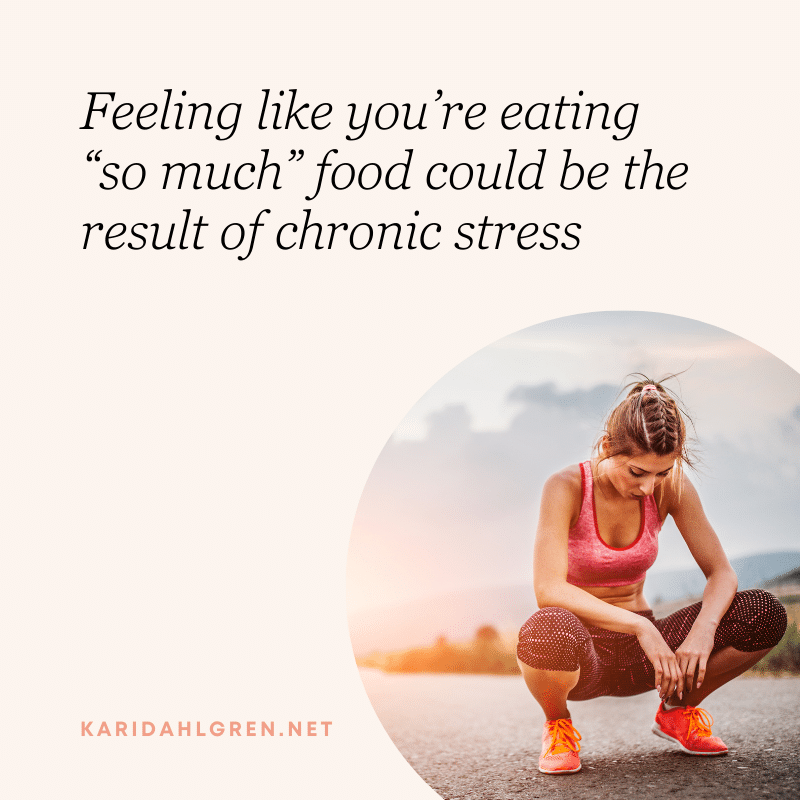
Stress triggers the release of cortisol, a hormone that can heighten appetite, among other things. Cortisol specifically increases the desire for hyperpalatable foods, which includes those high in fat, carbs, sugar, or salt.[15] If you tend to crave comfort foods while under stress, it could be an underlying factor behind the question, “Why am I eating so much?” especially if you try to limit your intake of such foods.
Furthermore, dieting itself is a source of stress which ironically triggers subsequent overeating.[16], [17] Instead of immediately blaming heightened hunger on stress, consider any intentions of dieting and how that restriction impacts your stress levels.
Bottom line: Chronic stress can lead to hormonal changes that increase hunger. Dieting can also increase stress, potentially leading to a vicious cycle of stress, excessive hunger, and overeating.
6. Poor Sleep
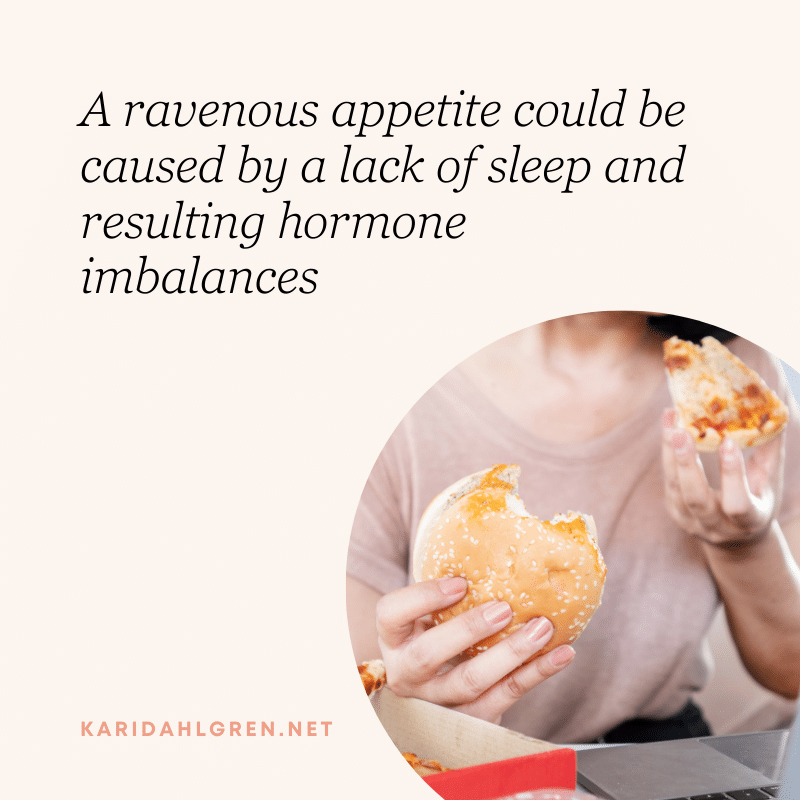
A lack of sleep does more than just leave you feeling groggy; it plays a direct role in increasing your hunger levels, which might leave you asking, “Why do I eat so much?” When you’re short on sleep, your body adjusts by increasing ghrelin, the primary hormone responsible for signaling hunger, and decreasing leptin, one of the hormones that signals fullness.[18] This imbalance creates a perfect storm for overeating.
Bottom line: The perception of eating large amounts of food could be influenced by poor sleep, which affects appetite-regulating hormones.
Why Am I Eating So Much? Looking at Medical Explanations
Before digging into the deeper psychological reasons behind the desire to overeat, it’s important to address a few more physiological causes first, because they are important. Here are some reasons to talk to your doctor if you’re concerned about eating lots of food:
7. Preexisting Medical Conditions
Sometimes, noticing a significant increase in your appetite could indicate an underlying medical condition such as diabetes, hyperthyroidism, Polycystic Ovary Syndrome (PCOS), or adrenal fatigue. If you find yourself constantly asking, “Why am I eating so much?” it may be worth discussing your concerns with your doctor who can conduct the necessary tests and provide treatment options if needed.
8. Side Effect of Medication
Certain medications, such as insulin prescribed for diabetes or antidepressants, can have the side effect of increasing your appetite. These drugs can affect your body’s hormone levels or how your brain perceives hunger and satiety. If you’ve noticed a surge in your hunger after starting a new medication, it’s a good idea to review its potential side effects.
9. Why Am I Eating So Much All Of A Sudden?
If you are a woman of child-bearing years and find yourself asking, “Why am I eating so much all of a sudden?” pregnancy could be a possibility. During pregnancy, the body undergoes significant hormonal changes that can lead to increased hunger as it works to support both you and the developing fetus. If you suspect this could be the reason behind your sudden hunger spikes, taking a pregnancy test or consulting with a healthcare provider can offer clarity.
10. Unlikely Reasons for Eating Large Amounts of Food
Before we unpack the steps for learning how to stop eating so much, let’s talk about a couple more factors that aren’t backed by much clinical evidence:
- Dehydration: While it’s true that some people can confuse hunger with thirst, there’s little evidence linking dehydration with overeating. In fact, an abundance of clinical studies show that dehydration is not a contributing factor in overeating tendencies.[19], [20], [21], [22] The next time you catch yourself asking, “Why do I eat so much food?” a glass of water is worth trying but unlikely to solve the problem.
- Nutrient deficiencies: Some sources claim that nutrient deficiencies can trigger overeating—particularly micronutrient (vitamins and minerals) deficiencies—yet clinical evidence is lacking. While there is an established link between obesity and micronutrient deficiencies, it is not a causal relationship.[23] However, some clinical evidence supports that an imbalance of macronutrients (carbohydrates, proteins, and fats) can trigger increased food intake. [14], [24]
Drinking water and ensuring your diet contains a healthy balance of micro- and macronutrients is always a good idea. When it comes to answering the puzzling question, “Why am I eating so much food?” always look for evidence-based reasons.
The Psychology of Eating: How to Stop Eating So Much
Now that we’ve exhausted the biological reasons for eating large amounts of food, let’s discuss steps you can take to stop feeling like you’re eating too much. If you already have a trusted doctor or dietitian by your side and still grapple with eating too much, the psychology of eating may have key insights. For those of you left wondering, “Why am I eating so much when I’m doing everything right?” this section is for you.
Here are some tips for learning how to stop eating so much—or perceiving that you’re eating too much:
- Give up dieting: Instead of restricting calories or fasting, consider adopting intuitive eating instead and listen to your body to inform what and when you eat. Research shows that intuitive eating is linked to better psychological health, improved eating habits, increased physical activity, greater body satisfaction, and improved metabolic fitness—among many other benefits.[25]
- Foster emotional awareness: If you struggle with stopping when you’re full, pay attention to your emotions. Research shows that binge eating can not only be motivated by negative emotions like stress, depression, and anxiety—but also positive emotions.[26], [27] If you struggle with the question, “Why am I eating so much?” look out for any patterns of eating for pleasure or eating out of distress.
- Develop emotional tolerance: If you identify a pattern between feeling like you’re eating large amounts of food and heightened emotions, focus on emotional skill-building to help reduce emotional eating. Research shows that a low tolerance for distress can increase overeating tendencies.[28], [29] To help with this, utilize tools like my Stop, Drop, & Feel technique, which encourages you to sit still with uncomfortable emotions and develop tolerance for them.
- Increase tolerance for boredom: Many of us know what it’s like to eat out of boredom, and research supports the link between boredom and emotional eating.[30] In my experience as an eating psychology coach, boredom is often a secondary emotion, wherein another primary emotion is the real trigger for overeating. Use tools like the Stop, Drop, & Feel to develop tolerance for boredom and enhance emotional awareness to reveal any hidden emotions underneath.
- Pay attention to social eating habits: Research shows that people are more likely to choose high-calorie foods if it means inducing positive emotion in others.[31], [32] However, it’s not worth sacrificing your health to make others feel comfortable. Avoid eating just because others are eating and promote positivity in healthy ways like having meaningful conversation.
- Manage stress via relaxation: If heightened stress is the source of a larger-than-usual appetite, focus on relaxation techniques. One study found that just 8 days of progressive muscle relaxation technique reduced night eating tendencies.[33] This may help individuals grappling with the thought, “Why am I eating so much food?” especially at night.
Last but certainly not least, as you navigate the reasons why you feel like you’re eating large amounts of food, treat yourself with compassion. Compulsive eaters can often be excessively self-critical and treat others with enormous compassion while struggling to show themselves the same grace. Try to hold as much space as you can for self-exploration with self-compassion.
Why Am I Eating So Much Food? The Answer Is Unique for Everyone
The reasons for craving large amounts of food are as diverse as the individuals. As you work to unravel the complex question, “Why am I eating so much?” keep in mind that portion size is subjective. Work with a doctor and/or dietitian to make sure that your meal sizes are a healthy portion for you.
If the desire to eat large amounts of food continues to emerge, turn your focus to the psychology of eating. Challenge cultural norms around dieting and focus on emotional skill-building to help address some of the root causes of overeating.



